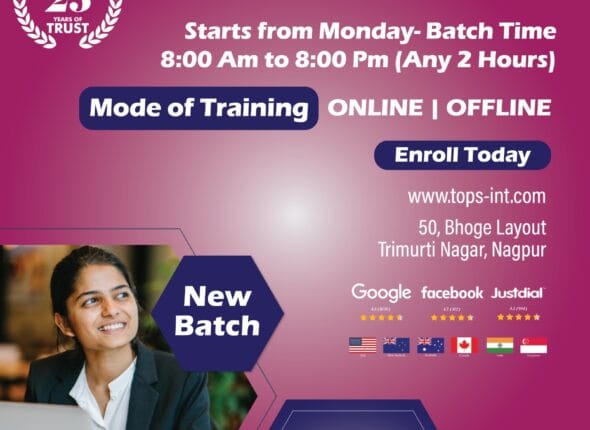Currently Empty: $0.00
Course Description
This course is designed to provide a comprehensive understanding of full-stack development using Java. Participants will learn how to build dynamic, end-to-end web applications, covering front-end, back-end, database management, and deployment. The curriculum includes hands-on projects, industry-standard tools, and real-world scenarios to equip learners with the skills required to thrive as a Full Stack Java Developer.
Who Can Join This Course?
- This course is ideal for:
- Beginners looking to enter the field of software development.
- Graduates in IT, Computer Science, or related disciplines.
- Working Professionals aiming to upskill for full-stack roles.
- Entrepreneurs interested in developing their own software solutions.
- Anyone passionate about web and application development with Java
Job Opportunities
- After completing the course, participants can apply for roles such as:
- Full Stack Java Developer.
- Java Back-End Developer.
- Front-End Developer (with Angular/React expertise).
- Software Engineer.
- Application Developer.
- Web Developer.
- DevOps Engineer
Course Curriculum
Application Development with Java
- PRE-REQUISITE:
- C/C++ Programming.
- PL/SQL.
- Basics of Designing.
MODULE 1 (Fundamentals):
- Software Engineering.
- SDLC Process.
MODULE 2 (Fundamentals):
- Introduction
- JVM, JDK, JRE
- Class Members
- Class, Object, Class Members
- Data Types
- Modifiers
- Constructor
- Garbage Collection
- Source File Layout
- Flow Control – Conditional and Looping Statements
- Arrays
- OOPs Concepts:
- Encapsulation
- Inheritance
- Polymorphism
- Overloading and Overriding
- Abstract and Interface
- Keywords: this, static, final, and super
- Object Wrapper Classes
- String Class with String Buffer and Builder
- Exceptions.
- File I/O:
- What is Stream and Types of Stream
- File Input and Output Stream and its Methods
- File Classes and Command Line Arguments
- Serialization and De-serialization
- Java GUI using Swing with Event Handling
- Collection API
- List – Vector and ArrayList
- Set – HashSet
- Map – Hash Map
- Collections with Examples
- Comparator and Comparable
- Threading
- Collection Framework with Generics
MODULE 3 (Database using JDBC):
- MySQL.
- DDL, DML, DQL, DCL.
- Constraints and Normalizations
- Joins, Index, and Views
- Procedures and Functions
- Types of Drivers
- JDBC with Architecture
- JDBC API and Methods
- Steps of JDBC Connectivity using MySQL
- Types of Statements and Metadata Interfaces
- CRUD Operation using Swing
MODULE 4 (Advance Java):
- Web Technologies in Java:
- HTML & CSS.
- JavaScript
- Client and Server Architecture
- HTTP Request and Response
- J2EE Architecture
- Web Component Development in Java
- CGI Programming:
- Process Advantage and Disadvantage
- Servlet Programming:
- Servlet API with Types
- Life Cycle
- Servlet Components, Listeners, Attributes
- Filters
- Java Server Pages Programming (JSP):
- JSP Translation Process with Life Cycle
- Types of Scripting and Components
- Directives, Implicit Objects, and Action Tags
- Core Tag Library with EL
- Custom Tags
MODULE 5 (Session & MVC):
- Session Management:
- Session Management API
- Session Tracking Technique
- Cookie
- Hidden Form Field
- URL Rewriting
- HTTP Session
MODULE 6 (Hibernate Framework):
- Fundamentals of Hibernate with Architecture.
- Hibernate Configuration using XML.
- Types of Relations:
- One-to-One
- One-to-Many
- Many-to-One
- Many-to-Many
MODULE 7 (Spring Framework):
- Spring Core:
- Overview of Spring Framework
- Introduction of Spring Framework Architecture
- Spring IOC Container
- Spring Dependency Injection
- Spring Bean Definition
- Aspect-Oriented Programming
- Spring DAO
- Spring ORM
- Spring MVC:
- Introduction
- Request Flow
- Framework Initialization/Configuration
- Spring Configuration with Eclipse
- Spring Page Redirection
- Spring Session Management
- Spring MVC Integration with Hibernate
MODULE 8 (Applicability of Industrial Project):
- Cloud Integration
- Application Deployment on Cloud
Additional Information:
- Project-Based Learning
- Hands-On Practical Training with tools and systems
- Personalized Support
- Certified Course in Java Application
Outcome for Learners:
- Build .NET-based web applications
- Work as freelancers
- Create web services and APIs
- Gain hands-on experience
- Build ERP and CRM applications
Courses You May Like
All Levels
(0.0/ 0 Rating)
Express Frame Work Development
₹5,000.00
In today's software industry, Nodejs has been widely popular for software engineers and web developers who want to utilize server-based javascript to build tools and...
- 0 Lessons
- 189 Students
All Levels
(0.0/ 0 Rating)
MongoDB Course
₹5,000.00
In today's software industry, Nodejs has been widely popular for software engineers and web developers who want to utilize server-based javascript to build tools and...
- 0 Lessons
- 189 Students
All Levels
(0.0/ 0 Rating)
Nodejs Development
₹5,000.00
In today's software industry, Nodejs has been widely popular for software engineers and web developers who want to utilize server-based javascript to build tools and...
- 0 Lessons
- 189 Students
All Levels
(0.0/ 0 Rating)
React Developer
₹5,000.00
Leverage the power and technology offered at Megasoft Technologies to create real-world native mobile apps using React Native. Learn to create an app prototype as...
- 0 Lessons
- 178 Students






